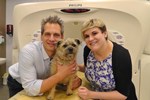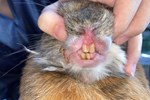Search - Research
31 - 40 of 191 results
-
New study reveals flat faced dogs have the highest risk when giving birth
New study by the RVC led by Dr Rowena Packer reveals flat faced dogs have the highest risk when giving birth -
New research shows Pugs have high health risks and can no longer be considered a ‘typical dog’ from a health perspective
A new study from the Royal Veterinary College suggests urgent action is needed as many health issues of Pugs are associated with their extreme body shape New research from the Royal Veterinary College (RVC) has revealed that the health of Pugs in … -
World first, RVC finds cognitive impairments in dogs with epilepsy
A series of pioneering research studies from the Royal Veterinary College (RVC) into dogs with epilepsy have revealed that: Dogs with epilepsy find it harder to obey commands, are slower to learn new tricks, have spatial memory deficits and are easily distracted. Aversive training methods, such as bark-activated collars, prong collars and verbal punishment are associated with poor trainability and their use should be avoided. Some anti-epileptic drugs (the medications commonly used to treat seizures) were found to worsen the cognitive impairment of dogs with epilepsy. Dogs with greater exposure to training activities, including obedience classes, agility, and gun-dog training, were found to be associated with higher trainability and have fewer signs of cognitive dysfunction.You can’t teach epileptic dogs new tricks? A series of pioneering research studies from the Royal …
-
The Kennel Club and VetCompass collaboration - most common health problems in UK dogs
Photo credit: https://puppyhero.com A recent study from the Royal Veterinary College (RVC), in collaboration with The Kennel Club, has found that the most common health problems in dogs are dental disease, obesity and ear infections. It is hoped … -
New RVC VetCompass research offers insights into clinical management and welfare impacts of rabbit dental disease
A team of researchers within the VetCompass Programme at the Royal Veterinary College (RVC) studying dental disease in rabbits under primary veterinary care have identified common clinical signs for rabbits experiencing dental disease and assessed … -
Royal Veterinary College walking with giraffes
Have you ever wondered how a giraffe’s long thin legs can support its weight and transport its bulky body as it walks for miles across the plains of sub-Saharan Africa? Researchers from The Royal Veterinary College's Structure and Motion Lab aim to … -
Research news - Editorial on purebred dog health
In a recent Vet Record editorial, Dan O'Neill described the progress that has been made to address purebred dog health since the Bateson report in 2010. VetCompass is featured as one of the projects aiming to improve the long-term health and welfare … -
How do muscles scale in cat species?
Post-doctoral researcher and Structure and Motion group member Dr Andrew Cuff has recently published two papers on the scaling of muscles in cat species. Here's what Dr Cuff has to say about the research: They are two closely related papers … -
Using clinical records to assess pain-related welfare in companion animals - a new YouTube video
Happy New Year! We kick start the New Year with a new YouTube video featuring an interview between Fergus Coutts of the University of Edinburgh and Dan O’Neill, in which they discussed the application of veterinary clinical records for research to … -
How we solved the 'bumblebee paradox' - Dr Richard Bomphrey is a STEM Career Hero of the Month
The Telegraph newspaper has this month designated Dr Richard Bomphrey of the Structure and Motion group as one of it's STEM Career Heroes. The STEM awards are designed to encourage innovation in the areas of science, technology, engineering and …










